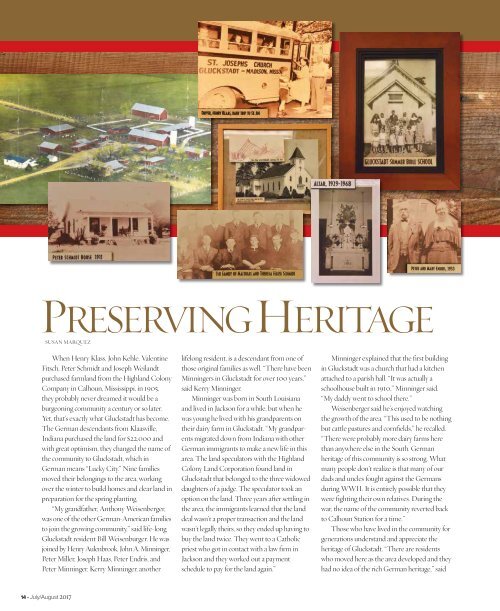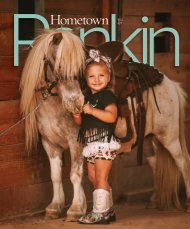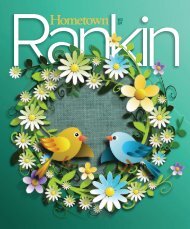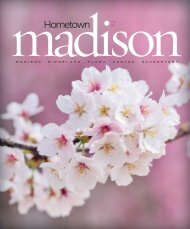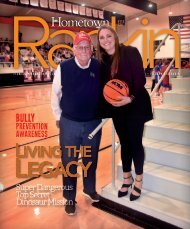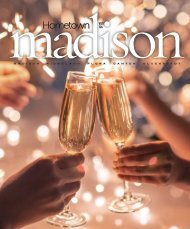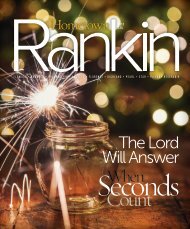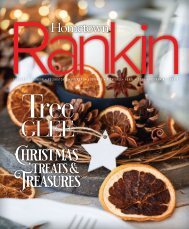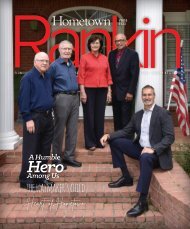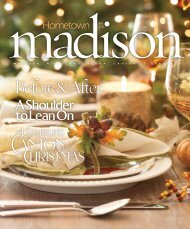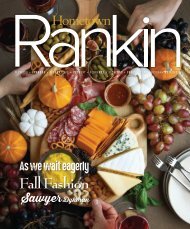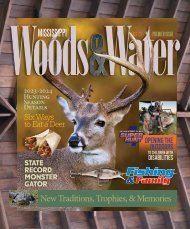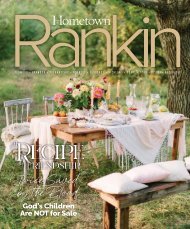Hometown Madison - July & August 2017
- No tags were found...
You also want an ePaper? Increase the reach of your titles
YUMPU automatically turns print PDFs into web optimized ePapers that Google loves.
Preserving Heritage<br />
Susan Marquez<br />
When Henry Klass, John Kehle, Valentine<br />
Fitsch, Peter Schmidt and Joseph Weilandt<br />
purchased farmland from the Highland Colony<br />
Company in Calhoun, Mississippi, in 1905,<br />
they probably never dreamed it would be a<br />
burgeoning community a century or so later.<br />
Yet, that’s exactly what Gluckstadt has become.<br />
The German descendants from Klaasville,<br />
Indiana purchased the land for $22,000 and<br />
with great optimism, they changed the name of<br />
the community to Gluckstadt, which in<br />
German means “Lucky City.” Nine families<br />
moved their belongings to the area, working<br />
over the winter to build homes and clear land in<br />
preparation for the spring planting.<br />
“My grandfather, Anthony Weisenberger,<br />
was one of the other German-American families<br />
to join the growing community,” said life-long<br />
Gluckstadt resident Bill Weisenburger. He was<br />
joined by Henry Aulenbrook, John A. Minninger,<br />
Peter Miller, Joseph Haas, Peter Endris, and<br />
Peter Minninger. Kerry Minninger, another<br />
lifelong resident, is a descendant from one of<br />
those original families as well. “There have been<br />
Minningers in Gluckstadt for over 100 years,”<br />
said Kerry Minninger.<br />
Minninger was born in South Louisiana<br />
and lived in Jackson for a while, but when he<br />
was young he lived with his grandparents on<br />
their dairy farm in Gluckstadt. “My grandparents<br />
migrated down from Indiana with other<br />
German immigrants to make a new life in this<br />
area. The land speculators with the Highland<br />
Colony Land Corporation found land in<br />
Gluckstadt that belonged to the three widowed<br />
daughters of a judge. The speculator took an<br />
option on the land. Three years after settling in<br />
the area, the immigrants learned that the land<br />
deal wasn’t a proper transaction and the land<br />
wasn’t legally theirs, so they ended up having to<br />
buy the land twice. They went to a Catholic<br />
priest who got in contact with a law firm in<br />
Jackson and they worked out a payment<br />
schedule to pay for the land again.”<br />
Minninger explained that the first building<br />
in Gluckstadt was a church that had a kitchen<br />
attached to a parish hall. “It was actually a<br />
schoolhouse built in 1910,” Minninger said.<br />
“My daddy went to school there.”<br />
Weisenberger said he’s enjoyed watching<br />
the growth of the area. “This used to be nothing<br />
but cattle pastures and cornfields,” he recalled.<br />
“There were probably more dairy farms here<br />
than anywhere else in the South. German<br />
heritage of this community is so strong. What<br />
many people don’t realize is that many of our<br />
dads and uncles fought against the Germans<br />
during WWII. It is entirely possible that they<br />
were fighting their own relatives. During the<br />
war, the name of the community reverted back<br />
to Calhoun Station for a time.”<br />
Those who have lived in the community for<br />
generations understand and appreciate the<br />
heritage of Gluckstadt. “There are residents<br />
who moved here as the area developed and they<br />
had no idea of the rich German heritage,” said<br />
14 • <strong>July</strong>/<strong>August</strong> <strong>2017</strong>


